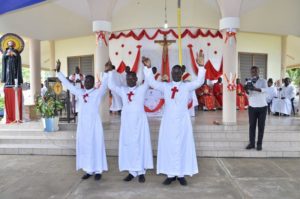 By Fr. Andrea Arvalli in Vita Nostra, Year LII, no.2, April-June 2001, pp.204-211.
By Fr. Andrea Arvalli in Vita Nostra, Year LII, no.2, April-June 2001, pp.204-211.
Conference held in Verona – San Giuliano on May 24, 2001 for the annual formation meeting, attended by about fifty religious.
The theme – related to that of authority in religious life – aroused interest and discussions, and provoked further questions and concrete proposals for implementation.
The rapporteur, Fr. Andrea Arvalli, a Conventual from Padova, is the master of novices.
Resistance to any discourse on community
It is not infrequent to meet resistance every time one has to speak of community life. Why so many distrust? Let us see some of the reasons.
The first is linked to the fear of ending up again ‘caged’ with the rigid community structures, in a return to the practice of ‘community acts’. In fact, if we speak of fraternal life in community, it is not to look at the community practices, but for the vital need of improving the quality of our fraternal life.
In one of the most beautiful recent magisterial documents on religious life, Fraternal life in community (of 1994), it is clearly mentioned that the value to be defended is that of fraternal life, while the community is only a means or instrument. It is a relationship that we could compare with that between body and soul. Community life provides the religious with those structures (structures of plausibility) that allow the value of ‘fraternal life’ to incarnate, grow and flourish.
Then there is a perplexity that concerns the very content of the value we are talking about: Is fraternal life in community constituted of religious identity or not? It seems that there is a suspicion that it is not so important. At times, one has the impression of being looked at with surprise. These doubts, rarely spoken laud, but active in practice, are indicative of a real fatigue. It does not seem to have penetrated the idea that the elements that characterise religious life are at least three: consecration through vows, community life, and apostolic mission.
Very often religious life was thought individualistically as characterised only by the consecration through vows, to which are added apostolic activities. They were reductive theological perspectives, which certainly do not delineate religious identity. Moreover today no one can pretend to ignore that the mission is not identifiable with the activities. Religious life is, in fact, missionary, more with life than with works, more with example than with doing, more with fraternal life than with our preaching. We know that, but do we really believe it? What consequences can we deduct?
Then there are lived uncertainties for years on the role of authority. How is it interpreted and understood? We recognize two radical directions: that of those who consider the authority unnecessary and emphasize the egalitarian dimension (from “you are all adults and you know what you must do” to “optional obedience”), and of those who consider authority as fundamental and absolute element (in practice: those who feel bad if they do not receive precise orders and dream of a return of the autocratic superiors).














Camillians on Facebook
Camillians on Twitter
Camillians on Instagram